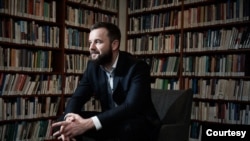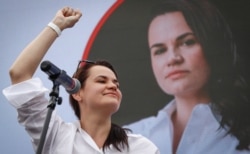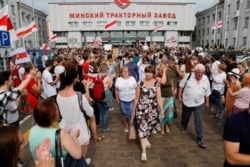A Washington, D.C.-based political analyst faces an uncertain future in Belarus – where he remains in prison charged with inciting mass unrest in the run-up to rigged elections that triggered a wave of protests in challenge to strongman Alexander Lukashenko’s 26-year rule.
Vitali Shkliarov, 44, is a Belarus native married to an American who news reports say works at the U.S. Embassy in Kyiv. He was arrested July 29 while visiting his parents in his hometown of Grodno.
KGB agents detained him as he went out to the store to buy a watermelon for his son. He managed to issue one quick message on his popular Telegram channel: “arrested.”
Authorities accuse him of working with an opposition blogger and would-be presidential candidate, Sergey Tikhanovsky, to sponsor “group actions that grossly violate public order.”
Tikhanovsky was barred from the race and later arrested while passing out leaflets in support of a surrogate candidacy by his wife, Svetlana Tikhanovskaya, who has since emerged as the face of the opposition.
Foreign interference conspiracies
The elections — which Lukashenko claims he won in a landslide over Tikhanovskaya despite evidence of mass vote rigging — have led to the largest protests in Belarus since the fall of the Soviet Union.
A state crackdown on demonstrators in the wake of the vote has only fueled public anger, with widespread reports of torture and abuse at the hands of police and security forces. Authorities report nearly 7,000 arrests.
But as discontent with Lukashenko swelled even before the election, Lukashenko warned of foreign plots to overthrow his government.
Enter Shkliarov.
“Some people were detained with American passports, married to Americans, working in the State Department,” said Lukashenko, in what appeared to be comments directed at Shkliarov’s arrest in particular.
“Vitaly’s become a convenient scapegoat for Lukashenko’s security forces,” said Skliarov’s lawyer, Anton Gashinsky, in an interview with VOA.
“He ideally fits the picture that they’re trying to draw: foreigners came from abroad to organize a revolution.”
Shkliarov denies he was active in Tikhanovsky’s campaign and says he is being punished for writing critically about the government in the run-up to the election.
A prolific political commentator on events in America and the former Soviet Union, Shkliarov’s writings have appeared in Foreign Policy magazine and Russia’s independent Novaya Gazeta among other publications.
He has also advised on presidential campaigns in Russia, Georgia and the United States — where he worked as a field staff organizer for former President Barack Obama and Senator Bernie Sanders of Vermont.
The Belarusian human rights group Viasna has recognized him as a political prisoner. The European Federation of Journalists, EFJ, is also demanding his release.
If found guilty of charges, Shkliarov faces up to three years in prison and fines.
Conditions inside
Shkliarov has detailed a grim existence since his detention last month.
“Like any person daring to criticize an authoritarian regime, I understood you can’t swear off prison. But when they arrested me, I didn’t expect that I would fall into a totalitarian torture chamber,” Shkliarov wrote in a statement released to Novaya Gazeta Monday.
“No, they don’t beat me. But they’re trying to break me. With everything they have,” he added.
Shkliarov said he was put in a dirty, overcrowded cell with no hot water despite increasingly brisk temperatures in Belarus. Inmates are forced to shave with a dull razor and given one shower weekly – prompting skin breakouts. Patriotic Soviet music blasts through the prison from morning until night. Prisoners are forbidden to lay down throughout the day.
He said he has also been denied contact with family members through mail, and that his writings and letters are read and confiscated by authorities.
Complaints led to a six-hour stint in the stakan – Russian for “the glass” – a vertical isolation cell with no room to sit while deprived of food and water.
"He’s constantly under psychological pressure,” his lawyer, Gashinsky, said to VOA. “He’s living in conditions he considers inhuman to try and break him psychologically.”
“It shouldn’t be this way. This isn’t 1937,” added Gashinsky in a reference to the height of the Soviet-era repressions.
Responding to inquiries from VOA, the U.S. Embassy in Minsk acknowledged a consular officer had been granted access to Shkliarov on August 13 after “repeatedly" raising concerns.
“We continue to press for fair treatment, judicial transparency, and regular visits by U.S. consular officials,” read the statement.
“We have no higher priority than the safety and welfare of U.S. citizens abroad,” it said.
Other U.S. lawmakers say they, too, are paying attention.
“The government’s ongoing crackdown on the democratic opposition, as well as the arrest of American citizen Vitaly Shkliarov, is a calamity and completely unacceptable,” said Senator Bob Menendez of New Jersey, the ranking Democrat on the Senate Foreign Relations Committee, in a statement.
“Now more than ever, the international community must not waver in our steadfast support for democracy, human rights and the aspirations of the Belarusian people.”
It is a message Shkliarov came to identify with during his own experiences on the campaign trail in America.
In an interview with Public Radio International’s The World in 2018, he recalled his experiences urging Americans who were reluctant to vote in the U.S. presidential elections during cold-calls over the phone.
“I grew up in a country where nobody asked us. Nobody asked me what president I would love to elect or even who I am. Nobody cared,” Shlkiarov said he would tell people.
“And here you have this democracy. You can actively voice your opinion and influence the decision-making. This is amazing. You guys don’t understand what you have.”
Most, said Shkliarov, promised to cast their ballots.






